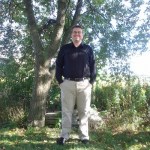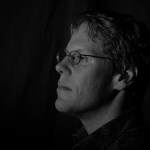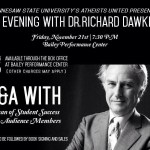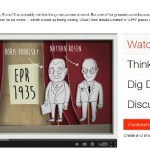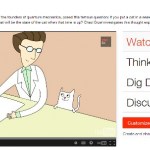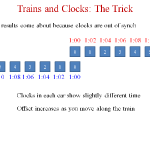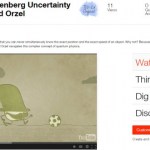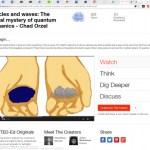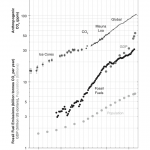education
I've decided to do a new round of profiles in the Project for Non-Academic Science (acronym deliberately chosen to coincide with a journal), as a way of getting a little more information out there to students studying in STEM fields who will likely end up with jobs off the "standard" academic science track.
Ninth in this round is a physics major turned semiconductor engineer.
1) What is your non-academic job? I am a Plasma Etch Process Engineer at Avago Technologies, which is a semiconductor/MEMS company that produces Wireless semiconductor devices.
2) What is your science background? I…
I've decided to do a new round of profiles in the Project for Non-Academic Science (acronym deliberately chosen to coincide with a journal), as a way of getting a little more information out there to students studying in STEM fields who will likely end up with jobs off the "standard" academic science track.
Eighth in this round is Grant Goodyear, who started life as a theoretical chemist, and now does nuclear physics in the oil industry.
1) What is your non-academic job? These days I'm a nuclear physicist who works on the design and characterization of nuclear well-logging tools that are used…
I've decided to do a new round of profiles in the Project for Non-Academic Science (acronym deliberately chosen to coincide with a journal), as a way of getting a little more information out there to students studying in STEM fields who will likely end up with jobs off the "standard" academic science track.
Seventh in this round is a physics major who went into teaching high school, then decided to try medical school, and now works with the youngest possible subjects. He also had the excellent taste to send along a picture of himself with his dog...
1) What is your non-academic job? I am the…
Children who have the opportunity to attend full-day preschool programs, versus part-day programs, tend to score higher on school readiness measures such as language, math, socio-emotional development and physical health, according to a recent study. So, why is this finding important to public health? Because education has literally been described as an “elixir” for lifelong health and wellbeing.
When it comes to the upstream factors that can put people on a lifelong trajectory toward longer life expectancy, greater health and less chance of disability and disease, educational achievement is…
The Rolling Stone article, "A Rape on Campus" should be a must read for every one who attends college, plans to attend college, or has children or loved ones on a college campus, especially one with a significant fraternity presence. UVa is my alma mater for two of my degrees, but this story reminded me more of my experience as an undergraduate at Bucknell University, a small, private, liberal arts university in Pennsylvania which is also dominated by fraternity culture. My experience there with sexual assault was not as a victim, but as a member of one of the pseudo-legal sexual assault…
I've decided to do a new round of profiles in the Project for Non-Academic Science (acronym deliberately chosen to coincide with a journal), as a way of getting a little more information out there to students studying in STEM fields who will likely end up with jobs off the "standard" academic science track.
Third in this round is a physics teacher turned developer of physics education technology at Vernier.
1) What is your non-academic job? Title: Physics Education Technology Specialist
Dept: Tech Support and R&D
Responsibilities:
Support teachers using Vernier sensors, interfaces, and…
I've decided to do a new round of profiles in the Project for Non-Academic Science (acronym deliberately chosen to coincide with a journal), as a way of getting a little more information out there to students studying in STEM fields who will likely end up with jobs off the "standard" academic science track.
Second in this round is a computer scientist turned underwater warrior. With bonus video!
1) What is your non-academic job? I am a computer scientist at the Naval Undersea Warfare Center in Newport, RI. I work in the Ranges Department as a part of the Range Software branch. That means I…
Attention those of you in the Atlanta area!
The students in Kennesaw State University Atheists United have invited Richard Dawkins to speak on campus, and they are opening up their event to the public!
Tickets are available for purchase HERE!
Im gonna get him to sign our Nightwish poster!!! :-D
The statistics describing America’s prescription drug abuse epidemic are startling, to say the least. Here are just a few statistics from the Centers for Disease Control and Prevention: In 2009, prescription painkiller abuse was responsible for nearly half a million emergency department visits — a number that doubled in just five years. Of the more than 41,000 drug overdose deaths in the U.S. in 2012, more than half were related to pharmaceuticals. In 2012, U.S. health care providers wrote enough painkiller prescriptions — 259 million — to provide every, single American adult with their own…
The fourth video I wrote for TED-Ed is now live: Einstein's Brilliant Mistake: Entangled States. The title is not just an Elvis Costello reference, but gets at the fact that while the Einstein, Podolsky, and Rosen paper was wrong in that the local hidden variable theories they favored are impossible, it turned out to be important and productive.
As with the others, I'm very happy with the way this came out. The images are great, and I'm glad to get in the point that Bell's key insight involves measuring different properties for the two particles, which is sometimes glossed over. It was…
When it comes to substance abuse disorders, public health and the public at-large are hardly on the same page — in fact, they’re not even reading the same book. And that’s a serious problem for sustaining and strengthening efforts to treat addiction and advancing effective public health policy.
“We already know quite a bit about public attitudes toward mental illness and we were interested in learning more — especially in the context of prescription (painkiller) drug abuse — about what the public thinks about issues related to drug addiction,” Colleen Barry, who recently co-authored a study…
The third of the videos I wrote for TED-Ed is now live: Schrödinger's Cat: A Thought Experiment in Quantum Mechanics.This is using basically the same argument I outlined in this post, but with awesome animation courtesy of Agota Vegso. I'm impressed by how close the images that ended up in the video are to the pictures I had in my mind while I was writing it.
As I said in that old post, I dithered for a bit about whether to run with this argument, but decided I liked it enough to go ahead. You can legitimately quibble about some of the phrasing being a little too definite (or that Schrödinger…
If you like arbitrary numerical signifiers, this is the point where we can start to talk about plural dozens of Uncertain Dots hangouts. As usual, Rhett and I chat about a wide range of stuff, including the way we always say we're going to recruit a guest to join us, and then forget to do anything about that.
The video:
Other topics include how it's important to rip up your class notes every so often, the pros and cons of lab handouts/ lab manuals, and of course this week's Nobel Prize in Physics for blue LED's (shameless self-linkage).
I'm crushingly busy right now, largely because I had no…
Building excitement around school meals with the help of guest chefs and fresh recipes could be a significant boon for school lunch programs as well as student eating habits, a new study found.
Recently published in the journal Appetite, the study examined the impact of Chefs Move to Schools, an initiative of First Lady Michelle Obama’s Let’s Move campaign. With an overriding goal of encouraging schoolchildren to make healthier meal choices, Chefs Move to Schools pairs volunteer professional chefs with schools to offer cooking education to kids as well as culinary advice to school food…
My Gen Ed relativity course has mostly been me lecturing about stuff to this point, so on Wednesday I decided to shake things up a bit and convert a chapter of David Mermin's It's About Time. The idea was to get students up and moving around a bit, and actually making some measurements of stuff.
Mermin's scenario as adapted for class is this: you have two trains of six cars passing in opposite directions. Each car contains a narrow window through which the other train can be seen, a clock facing the window, and an observer with nothing better to do than note the readings of the clocks in the…
About one in every 10 U.S. children is living with asthma — that’s closing in on 7 million kids. And while we have a good handle on what triggers asthma attacks and exacerbates respiratory symptoms, exactly what causes asthma in the first place is still somewhat of a mystery. However, new research points to some possible new culprits that are difficult, if not nearly impossible, to avoid.
Those culprits are phthalates, ubiquitous chemicals found in just about everything, from food packaging to shower curtains to vinyl flooring to personal care products such as fragrances and shampoos. (…
The second one of the TED-Ed lessons I wrote about quantum physics has now been published: What Is the Heisenberg Uncertainty Principle. This is, again, very similar to stuff I've written before, specifically this old blog post and the relevant chapter of How to Teach [Quantum] Physics to Your Dog.
As usual, I tried but probably failed to do justice to other interpretations in the "Dig Deeper" references I sent; outraged Bohmians should feel free to comment either here or there with better explanations.
Again, it's really fun to see the images the animators found to put to my words. I love…
My TED@NYC adventure last fall didn't turn into an invite to the big TED meeting, but it did lead to a cool opportunity that is another of the very cool developments I've been teasing for a while now: I've written some scripts for lessons to be posted with TED-Ed. The first of these, on particle-wave duality just went live today.
The content here is very similar to my talk last fall, which is, in turn, very similar to Chapter 8 of Eureka: a historical survey of the development of quantum physics. I did the script for this, which was then turned over to professional animators, who did a great…
Steven Pinker has a piece at the New Republic arguing that Ivy League schools ought to weight standardized test scores more heavily in admissions. this has prompted a bunch of tongue-clucking about the failures of the Ivy League from the usual suspects, and a rather heated concurrence from Scott Aaronson. That last finally got me to read the piece, because I had figured I would be happier not reading it, but I wanted to see what got Scott so worked up.
Sadly, my first instinct was correct. It starts off well enough, taking down an earlier anti-Ivy League piece by William Deresiewicz for being…
Climate Smart & Energy Wise: Advancing Science Literacy, Knowledge, and Know-How by Mark McCaffrey is a book written primarily for teachers, to give them the information and tools they need to bring the topic of climate change effectively to their classrooms. It addresses the Climate Literacy and Energy Literacy frameworks, designed to guide teaching this important topic.
The book provides basics on climate and energy, approaches to teaching about climate and energy, and of special interest for teachers, syncing the topics with existing standards. The main point of the book is to get…
